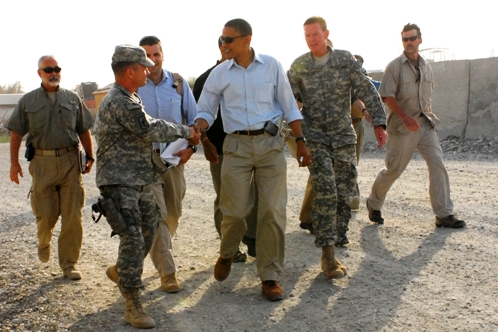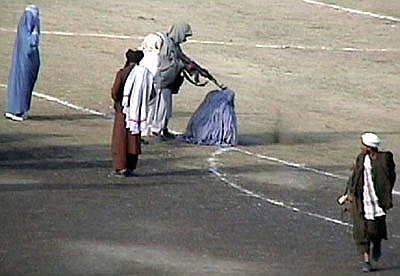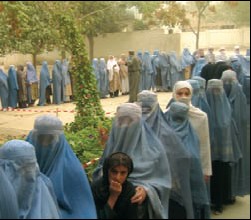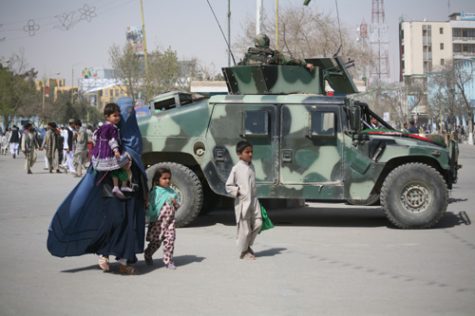Women’s Rights in Afghanistan
With US Military Troops withdrawing from Afghanistan, how will it effect women’s rights?

Senator Barack Obama meets with troops during his visit to Foward Operating Base Fenti, Afghanistan, July 19.

President Joe Biden is removing US Military troops from Afghanistan. According to the Washington Post, there are around 2500 US troops stationed in Afghanistan, however the number fluctuates and the actual number is likely closer to 3500.
The plan is to withdrawal all US troops by September 11th, 2021. The reasoning behind completing the military exit by the 11th of September is to commigrate 9/11’s 20th anniversary. The attacks on the Twin Towers 20 years ago are the reason the United States got pulled into its longest war in history.
Biden is removing troops from Afghanistan because the Taliban has promised to renew attacks on the US as well as NATO personnel if foreign troops were not out of Afghanistan by a certain deadline. The Taliban is a fundamentalist group in Afghanistan that controlled the country from 1996-2001. In 2001, the US led an invasion which knocked the Taliban out of power. Since then, the Afghan government has tried to take back control of their country with the help of the United States. After being forced over boarders by the United States, the Taliban regrouped and established an insurgency in Pakistan against the US- supported government. As of 2020, the Taliban signed a peace agreement with the United States in sharing power negations. With the signing of the peace agreements, it could lead to the long-wanted peace but, leaves many questions regarding Afghan Women’s rights.

In Afghanistan, women already do not have many rights, freedoms, or independence compared to women in the United States. People question the future of the few rights they enjoy right now, and how they will be affected when the United States completes the final withdrawal of troops.
According to the National Intelligence Council, “Afghan women have less access than men to capital, struggle to own property, and face obstacles to operating in mixed-gender workplaces. As of 2017, approximately 16 percent of working-age women were employed—compared to 41 percent of men—and just 5 percent of business owners and mid- and upper-level managers were women.” Taliban leaders enforce rules for women, giving them strict dress codes, also not allowing them to leave their homes without a male relative or their husband. Afghan women are required to wear a burqa in public, which completely covers their face except for their eyes. They wear the burqas because according to a spokesperson from the Taliban, “the face of a woman is a source of corruption”. The Taliban also would not allow girls to go to school. Many all-girl schools have been targeted by the Taliban, through bombings, raids, or gunfire. As of April 2021, roughly 3.5 million of the totals 9 million Afghans enrolled in school are female. This number has greatly increased in the past 20 years, along with more schools opening. However, in more recent years more and more schools have been shutting down due to insecurities and worries from the Taliban.

Queen Soraya was a pioneer in women’s rights in Afghanistan. In an article published by the New York Times, Queen Soraya is considered a “Woman before her time.” During her rule from 1919-29, the Queen and her husband, the king, spent many of their trips campaigning to help educate women, and fighting to give them more rights. On Afghanistan’s 7th year of independence, in 1926, Queen Soraya gave a speech saying, “Do you think that our nation from the outset needs only men to serve it? Women should also take their part as women did in the early years of our nation and Islam … we should all attempt to acquire as much knowledge as possible.” She and her husband continued to try and reform Afghanistan through their reign as king and queen. They campaigned against polygamy and women wearing veils. The couple practiced the things they campaigned against by the king only taking one wife, and Queen Soraya “tearing her veil off in public” according to the Arab News.
With the United States withdrawal, there is worry that the Taliban will take back full control of the country, with the Afghan government doing little to stop it. According to Brookings, “The United States’ leverage to preserve at least some of their rights and privileges is limited and diminishing. But it is hardly zero. And so, the U.S. must exercise whatever leverage it has remaining to preserve the rights and protect the needs of Afghan women.” The U.S. leaving Afghanistan is going to have major impacts on the rights women currently have.

Currently, women in Afghanistan are making some progress in gaining more rights. Women traditionally do not drive in Afghanistan. It has been looked down upon for years, but in more recent times you see more and more women driving. These are all steps in the right direction for Afghan women. According to CNN, it has been reported that “if the Taliban were again Afghanistan’s dominant power, we assess that any prospect for moderating the group’s policies toward women would lie with ethnic minorities’ ability to maintain local variation and technological development since the Taliban’s previous rule.” Which means the Taliban’s views on women’s right have not changed since their rule in the late 90’s early 2000’s.
Without aid from foreign troops there is a risk that the Taliban will regain full control of the country. Hopefully the progress Afghan women are making in gaining more rights will not be stymied.



